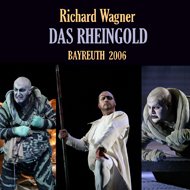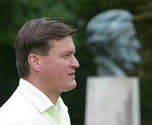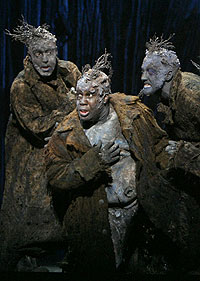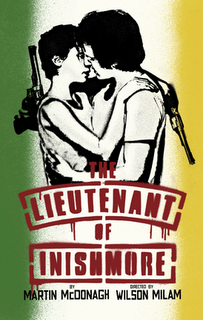 Any new production of Wagner's Siegfried ultimately has to be judged based on the merits of the heldentenor singing the young title role. It is one of the longest roles in opera, and also one of the most difficult. Like Bellini's bel-canto masterpiece, Norma, Siegfried only works if the singer is able to present the public with a credible portrayal of the role by making them aware that the notes on the staff only present the kind of challenge that the singer is able to conquer. Thankfully, this is what happened two days ago when American heldentenor Stephen Gould stepped up to his first Siegfried at Bayreuth. He was an amazing Tannhäuser last year, but during this festival he has proven that he has the right stuff to tackle the really big role. Right from the start his Siegfried rang true with a clean top and secured notes that one rarely hears. Mr. Gould did not warm up to the role, right from his first entrance he came prepared. The worse one can say about his performance is that as the evening progressed, one started hearing a bit of tiredness in his voice, but given the length of the part that is normal. He managed to complete the role without any vocal misshaps whatsoever. These days, that is a really rare event when it comes to the two last operas of Wagner's Ring.
Any new production of Wagner's Siegfried ultimately has to be judged based on the merits of the heldentenor singing the young title role. It is one of the longest roles in opera, and also one of the most difficult. Like Bellini's bel-canto masterpiece, Norma, Siegfried only works if the singer is able to present the public with a credible portrayal of the role by making them aware that the notes on the staff only present the kind of challenge that the singer is able to conquer. Thankfully, this is what happened two days ago when American heldentenor Stephen Gould stepped up to his first Siegfried at Bayreuth. He was an amazing Tannhäuser last year, but during this festival he has proven that he has the right stuff to tackle the really big role. Right from the start his Siegfried rang true with a clean top and secured notes that one rarely hears. Mr. Gould did not warm up to the role, right from his first entrance he came prepared. The worse one can say about his performance is that as the evening progressed, one started hearing a bit of tiredness in his voice, but given the length of the part that is normal. He managed to complete the role without any vocal misshaps whatsoever. These days, that is a really rare event when it comes to the two last operas of Wagner's Ring.Every evening of this year's Ring production has offered a welcomed surprise. Das Rheingold offered good ensemble singing and wonderfully evocative conducting from Christian Thielemann. Die Walküre revealed the wonders of Adrianne Pieczonka's incredibly beautiful interpretation of Sieglinde. (Clearly she wins the prize for surprise of the summer!) As I write this blog during the intermission between Acts II and III of Götterdämmerung, I am incredibly excited to report that the Hagen (Hans-Peter König) is absolutely out of this world. His call to arms of his vassals in Act II was one of the highlights of this entire Ring. Wow!
Don't forget to catch the rebroadcasts of these performances if you have missed them. They will be playing on Internet radio, and you can get an entire schedule of the upcoming performances by going here.






